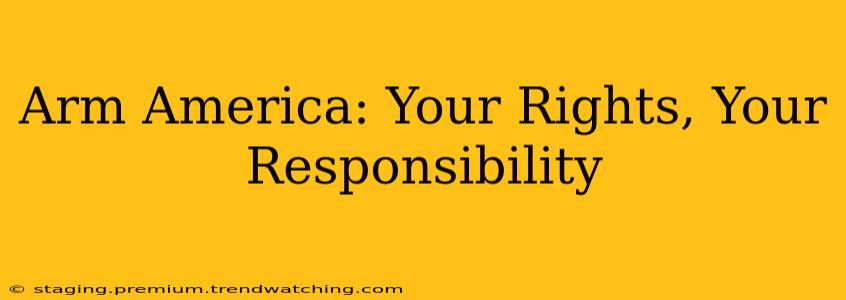The Second Amendment to the United States Constitution guarantees the right to keep and bear arms, a right fiercely debated and deeply ingrained in American culture. This right, however, comes with significant responsibilities. Understanding both the rights and the responsibilities associated with firearm ownership is crucial for responsible gun ownership and for fostering a safer society. This comprehensive guide explores the intricacies of arming oneself in America, addressing key questions and concerns.
What are my rights regarding owning firearms in America?
The Second Amendment states, "A well regulated Militia, being necessary to the security of a free State, the right of the people to keep and bear Arms, shall not be infringed." While the precise interpretation of this amendment has been a subject of ongoing legal and political debate, it generally grants citizens the right to possess firearms for lawful purposes, including self-defense. However, this right is not absolute and is subject to reasonable regulations. These regulations vary significantly by state and locality, covering areas like background checks, waiting periods, permitted types of firearms, and restrictions on carrying concealed weapons. It's crucial to understand the specific laws in your state and locality before purchasing or possessing any firearm.
What are the responsibilities that come with owning a firearm?
The right to bear arms is inextricably linked to a heavy responsibility for safe and legal gun ownership. This includes:
- Safe Storage: Securely storing firearms to prevent unauthorized access, especially by children, is paramount. This often involves using gun safes, trigger locks, or other safety devices.
- Proper Training: Competent firearm handling and safety training are essential. This includes understanding gun safety rules, proper cleaning and maintenance, and responsible marksmanship. Many organizations offer training courses for both beginners and experienced gun owners.
- Legal Compliance: Staying informed about and adhering to all federal, state, and local laws regarding firearms is non-negotiable. This includes understanding background check requirements, licensing procedures, and restrictions on carrying firearms in public places.
- Responsible Use: Using firearms only for lawful purposes and exercising extreme caution when handling them is critical. Accidental discharges can have devastating consequences.
- Awareness of Mental Health: Individuals experiencing mental health issues may be prohibited from owning firearms in some jurisdictions. It's crucial to be aware of these restrictions and seek professional help if needed.
What are the potential consequences of irresponsible gun ownership?
Irresponsible gun ownership can lead to severe consequences, including:
- Accidental Injuries or Deaths: Negligent storage or handling of firearms can result in accidental shootings, leading to serious injury or death.
- Criminal Charges: Violation of gun laws can result in hefty fines, imprisonment, and a criminal record, severely impacting future opportunities.
- Civil Liability: Negligent gun owners can be held liable for damages caused by their firearms, resulting in significant financial penalties.
- Erosion of Public Trust: Irresponsible gun ownership undermines public trust and can contribute to stricter gun control measures.
How can I learn more about firearm safety and responsible gun ownership?
Numerous resources are available to help you learn more about firearm safety and responsible gun ownership. These include:
- National Shooting Sports Foundation (NSSF): The NSSF offers various safety resources and educational materials.
- State and Local Law Enforcement Agencies: Your local police department or sheriff's office can provide information on firearm laws and safety courses in your area.
- Certified Firearms Instructors: Seek out certified instructors who can provide hands-on training in safe gun handling and marksmanship.
Are there any restrictions on who can own a firearm?
Yes, several restrictions exist on who can legally own a firearm. These typically include individuals with a felony conviction, a history of domestic violence, or a documented mental health condition that poses a risk to themselves or others. Specific restrictions vary by state and federal law. It's crucial to research the specific laws in your area before purchasing a firearm.
What is the role of the government in regulating firearms?
The government plays a significant role in regulating firearms through a combination of federal and state laws. These regulations aim to balance the right to bear arms with public safety concerns. These laws cover various aspects of firearm ownership, including background checks, waiting periods, permitted types of firearms, and restrictions on carrying concealed weapons. The debate surrounding the extent and nature of these regulations is ongoing and highly contested.
Responsible gun ownership is a multifaceted issue demanding careful consideration. By understanding both your rights and responsibilities, you contribute to a safer community for everyone. Remember, responsible gun ownership is not just about exercising your right; it’s about fulfilling your responsibility.

